《开讲啦》威廉王子登上中国综艺节目演讲
《开讲啦》经典语录
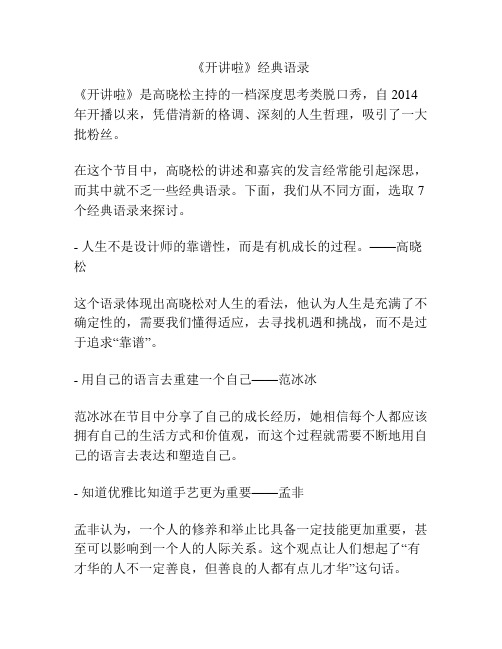
《开讲啦》经典语录《开讲啦》是高晓松主持的一档深度思考类脱口秀,自2014年开播以来,凭借清新的格调、深刻的人生哲理,吸引了一大批粉丝。
在这个节目中,高晓松的讲述和嘉宾的发言经常能引起深思,而其中就不乏一些经典语录。
下面,我们从不同方面,选取7个经典语录来探讨。
- 人生不是设计师的靠谱性,而是有机成长的过程。
——高晓松这个语录体现出高晓松对人生的看法,他认为人生是充满了不确定性的,需要我们懂得适应,去寻找机遇和挑战,而不是过于追求“靠谱”。
- 用自己的语言去重建一个自己——范冰冰范冰冰在节目中分享了自己的成长经历,她相信每个人都应该拥有自己的生活方式和价值观,而这个过程就需要不断地用自己的语言去表达和塑造自己。
- 知道优雅比知道手艺更为重要——孟非孟非认为,一个人的修养和举止比具备一定技能更加重要,甚至可以影响到一个人的人际关系。
这个观点让人们想起了“有才华的人不一定善良,但善良的人都有点儿才华”这句话。
- 面对未来一片茫然时,可以先问问自己,我想要什么。
——方清平在这个时代,随着社会的变化和信息的爆炸,很多人在面对未来时感到迷茫,方清平提醒大家,我们需要先定个目标,才能真正走向自己的理想人生。
- 别让自己的生命被别人的期待所控制——罗振宇很多人为了迎合别人期待或者社会主流,放弃了自己原本的理想和生活方式。
罗振宇提醒我们要站在自己的位置上思考问题,走自己的路让别人说去吧。
- 选择会影响命运,但不要因此而害怕选择——孙坚每个人的命运是由自己选择的路决定的,但很多时候,人们因为怕选择错误而选择放弃。
孙坚在节目中提醒我们要勇敢做选择,即使选择错误,也可以吸取经验完善自己。
- 背负那么重的稳重,却失去了一扇门——谷嘉诚在职场上,很多人为了能够站稳脚跟,都会将自己包装成稳重的形象。
但是,谷嘉诚提醒大家,不要因为要保持形象和稳重,而失去了一些可贵的机遇和人脉关系。
这七个经典语录虽然各自表述的方向不同,但其本质都是提醒我们要坚持自我,敢于选择,相信自己,追求真相,在生命的道路上走得更加精彩。
观绿色承诺有感600字五篇
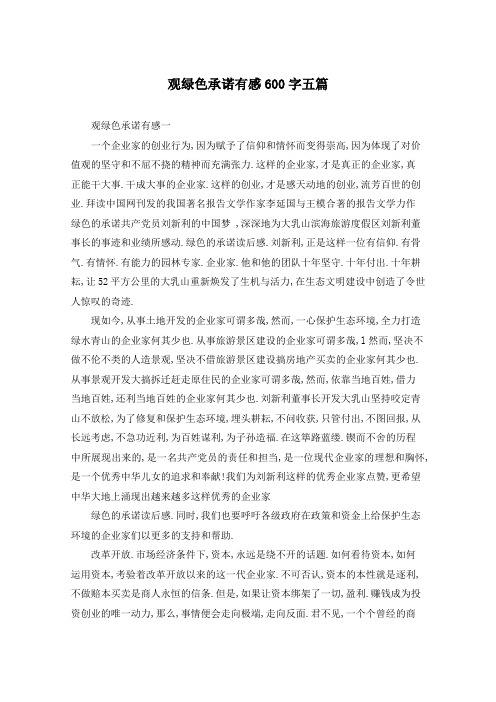
观绿色承诺有感600字五篇观绿色承诺有感一一个企业家的创业行为,因为赋予了信仰和情怀而变得崇高,因为体现了对价值观的坚守和不屈不挠的精神而充满张力.这样的企业家,才是真正的企业家,真正能干大事.干成大事的企业家.这样的创业,才是感天动地的创业,流芳百世的创业.拜读中国网刊发的我国著名报告文学作家李延国与王模合著的报告文学力作绿色的承诺共产党员刘新利的中国梦 ,深深地为大乳山滨海旅游度假区刘新利董事长的事迹和业绩所感动.绿色的承诺读后感.刘新利,正是这样一位有信仰.有骨气.有情怀.有能力的园林专家.企业家.他和他的团队十年坚守.十年付出.十年耕耘,让52平方公里的大乳山重新焕发了生机与活力,在生态文明建设中创造了令世人惊叹的奇迹.现如今,从事土地开发的企业家可谓多哉,然而,一心保护生态环境,全力打造绿水青山的企业家何其少也.从事旅游景区建设的企业家可谓多哉,l然而,坚决不做不伦不类的人造景观,坚决不借旅游景区建设搞房地产买卖的企业家何其少也.从事景观开发大搞拆迁赶走原住民的企业家可谓多哉,然而,依靠当地百姓,借力当地百姓,还利当地百姓的企业家何其少也.刘新利董事长开发大乳山坚持咬定青山不放松,为了修复和保护生态环境,埋头耕耘,不问收获,只管付出,不图回报,从长远考虑,不急功近利,为百姓谋利,为子孙造福.在这筚路蓝缕.锲而不舍的历程中所展现出来的,是一名共产党员的责任和担当,是一位现代企业家的理想和胸怀,是一个优秀中华儿女的追求和奉献!我们为刘新利这样的优秀企业家点赞,更希望中华大地上涌现出越来越多这样优秀的企业家绿色的承诺读后感.同时,我们也要呼吁各级政府在政策和资金上给保护生态环境的企业家们以更多的支持和帮助.改革开放.市场经济条件下,资本,永远是绕不开的话题.如何看待资本,如何运用资本,考验着改革开放以来的这一代企业家.不可否认,资本的本性就是逐利,不做赔本买卖是商人永恒的信条.但是,如果让资本绑架了一切,盈利.赚钱成为投资创业的唯一动力,那么,事情便会走向极端,走向反面.君不见,一个个曾经的商业巨人倒下了,一个个曾经的资本大鳄破产了,一个个曾经的产业帝国湮灭了.过度的开发,失控的发展,背后是极度的贪欲,疯狂的逐利,反映出的是道德的沦丧,心灵的扭曲.人性之丑陋,在资本的拷问下一览无余.此时此刻,有一种坚守令人肃然起敬.刘新利及其团队在两次大股东撤资面前,不改初衷,坚韧不拔,抱团取暖,勠力同心,最终转危为安,渡过难关.重视融资.投资,善于资本运作,同时又时刻警惕资本的绑架,让资本为事业服务,为创业助力,为百姓谋利.共产党员刘新利在与资本的较量中赋予了资本以新的属性.之所以能做到这一切,崇高的价值追求,不屈的道德固守,就是他的法宝和定力.生态旅游开发必然要面临种.种矛盾,既要保护自然环境,又要建设景观设施;既要着眼长远发展,又要顾及当前利益;既要追求事业成功,又要实现个人追求.许多时候,这些两难选择很难两全.在这种情况下,不少企业家往往舍弃了前者,选择了后者.于是,在捞到银子就走的房地产商摩肩接踵后,强行拆迁愈演愈烈,半截子工程不时出现.烂尾楼建筑随处可见,人造景观比比皆是,生态环境破坏殆尽.大乳山的生态旅游开发在面对和解决这些矛盾时,却交出了令人满意的答卷,显现出相互兼顾.可持续发展的良好态势.她的与众不同,靠的是一个理念生态效益第一,社会效益第二,经济效益第三,以及坚守这个理念的一支特别能战斗的生态铁军.在建设生态文明已经作为国策的当下,这样的发展观.创业观无疑是最需要大力弘扬的.观绿色承诺有感二中国共产党的宗旨就是为人民服务,中国共产党的事业就是为中华民族的千秋万代谋利益.共产党员刘新利以他全身心投入生态文明建设的创业历程,生动地实践了党的宗旨.他的大乳山生态建设没有拆迁一户村民,相反,让当地老百姓参与其中,在这里安居乐业,尽享生态之美.生态之乐.生态之福.而他自己却没有建别墅.盖私宅,至今一家四世同堂住在职工宿舍.心里想着老百姓,干事为着老百姓,创业造福老百姓,这就是一位优秀共产党员的高尚追求.相比之下,那些贪官.昏官.庸官是多么的低下和可耻.这里不由联想到作者李延国的另一部长篇报告文学力作根据地 .在那部著作中有一句振聋发聩的话,民心才是真正的根据地. 绿色的承诺与根据地一脉相承.如果说民心是共产党生存发展的根据地,得民心者得天下,那么民生就是共产党治国理政的奠基石,一心一意为老百姓谋利益才能最终实现中华民族伟大复兴的中国梦.绿色的承诺结尾描述了刘新利与百年老银杏树的对话,神来之笔,令人动容!共产党员刘新利,他的情怀,他的境界,他的寄托,他的愿望,全部浓缩在了这绿色的承诺里.这承诺,是对大地的承诺,是对生命的承诺,是对未来的承诺!感谢作者让我们认识了刘新利这位园林专家.企业家,优秀的共产党员.更感叹作者气吞山河的胸怀,深邃独到的眼光,纵横捭阖的笔力.大乳山这块神奇的土地,是什么让她千疮百孔,又是什么让她起死回生,更靠什么让她永葆青春?这是绿色的承诺留给我们深入思考的问题.生态文明建设,关系到千秋万代的事业.我们已经起步,我们义无反顾!观绿色承诺有感三绿,总能让人联想到大自然,想到一望无际的森林.让人觉得舒心.悠然.然而,我们身边的绿色正在飞快地减少.路边浓绿的大树,在无数辆车经过后,蒙上了厚厚的灰尘;门前翠绿的草坪,在施工队来过后,变成了平整的水泥路;工厂长长的烟筒,在黑暗中排出滚滚浓烟,为城市蒙上一层薄纱人们不得已带上厚厚的口罩,远离城市的喧嚣,躲在公园小小的一方地,贪婪地呼吸新鲜的空气.人们这才意识到:绿色已是多么珍稀!随着绿色而减少的可爱的生灵已是多么珍惜!英国威廉王子在中国综艺节目开讲啦英国行节目中亮相.为的是什么?为的是呼吁人们保护野生动物,不要再为了利益.为了虚荣去残害小动物.在节目中,王子强调:如果非洲象按目前每天54头的数量持续被杀戮,当我女儿夏洛特公主25岁时,世界上将没有非洲象.这是惨痛的事实.比这更触目惊心的是:经粗略测算,400年间,生物生活的环境面积缩小了90%,物种减少了一半.而现在,每20分钟就有一种动物宣告灭绝.人们开始保护环境,开始推崇绿色.由此应运而生了绿色食品.绿色建筑.绿色服饰.绿色建筑仿若如此便是保护环境,健康生活,但这样收效甚微.人们是否能在植树节种下几棵小树,悉心照料;是否能在不必要时关闭高速运转的空调;是否能在出行时,考虑公共交通.绿色交通工具这才是真正的绿色意识,而并非在铺天盖地的宣传下形成的绿色意识.保护环境吧!为了自己能享受新鲜的空气.美丽的环境;为了他人能摘下几乎成为身体一部分的口罩;为了其他生灵能拥有美好的家园观绿色承诺有感四在现代,有些人在不断地犯错,做着伤害地球的事情;但同样也有些人在弥补他人犯下的错,在努力改善,保护着几十亿人共同的家园——地球.这些人默默地付出着,他们用自己微不足道的力量慢慢地改变着现状.越来越多的人加入到他们的行列,努力让地球妈妈更加健康.他们不使用塑料.一次性物品.费材料的东西,他们十分环保.《绿色承诺》一书中也提到过许多人,例如:在9岁时就创办了个人环保网的任艺;干活攒钱为非洲孩子挖井的瑞恩;为土地〝治病〞的党永富;节约纸张的袁日涉和回收废旧笔芯的董宇飞等等.最令我钦佩的是瑞恩.袁日涉和董宇飞.瑞恩想给非洲孩子们挖井仅仅是因为老师在课上提了一下,他不仅是这么想的,也是这么做的,他把一次次做家务得来的钱一点一点地积攒起来,当他以为钱攒够了,可以为非洲孩子们挖井时,工作人员告诉他钱并不够,但他没有气馁,他和许多好心人不断努力着,让非洲孩子们有了干净的水喝. 袁日涉为了让人们节约纸张,成立了〝一张纸小队〞,而他当时只有6岁!这么小就知道要保护环境,保护树木,难道那些浪费纸张的成年人还不如一个小孩吗?这是多么羞愧的事情啊!袁日涉和小伙伴们在几个月间就攒了五千多张纸,订成了四百本环保本,发给全校同学.〝一张纸小队〞的人数在不断增加,他们将两面都写过的纸换成树苗,并种下了小树苗,他们希望自己种下的树长大以后可以保卫北京呢! 董宇飞将对大地有害的废旧笔芯收集起来,因为废旧笔芯中有剩余墨水,浮脂等污染物,不经过合理回收,会污染到土壤,经水循环,最终会危害我们的生命健康.笔芯的笔杆是塑料做的,埋在地下几百年都不会腐烂.笔头属于金属,对人们危害极大.他为了减少笔芯的数量,用起了钢笔,他希望人们不再使用耗材料,又不环保的东西,让地球更加美丽.听了他们的故事,你是不是也深有感触呢?我觉得,今后我要少使用塑料袋和一次性用品,多用布袋买菜,去超市时自己带好袋子,不用超市出售的塑料袋.保护环境,从我做起,从家人做起,从大家做起!观绿色承诺有感五46亿年前,一颗蓝色的星球诞生在茫茫的宇宙中,她是那样的美丽,她就是我们的母亲——地球.而如今,那些美丽逐渐消逝,翻开《绿色承诺》这本书,不禁让我对〝地球〞这个属于全世界的代名词而陷入深思……《绿色承诺》这本书是一本主打地球生物对地球所起巨大重要的书籍,它向我们一一详细介绍了大气层.土壤.森林等对地球的作用,从而呼吁人们保护地球,维护这个绿色的生态环境.书中描绘了不少地球的美丽,可是回归现实,那些美丽还真正存在吗?______主席曾说过:〝我们既要绿水青山,也要金山银山,宁要绿水青山,不要金山银山……〞可在现实的社会下,这些话不禁显得有些〝荒谬〞了.现实生活中,地球那美丽的长发——流水,已被人们排放的废物涂得污秽不堪,而人们却迟迟不肯醒悟,沉浸在破坏环境而换取暴利的喜悦中;地球那美丽的长衫——森林,已被人们砍得所剩无几,而人们还是享受着暂时的利益,却不知地球妈妈已经蒙羞;地球那美丽的皮肤——土地,已被人们的〝白色〞物品和各种药水弄得皮开肉绽,而人们依旧只顾自己的利益,不知那无边的沙漠即将淹没自己……回首一点一滴,地球的美丽也在一点一滴地消逝.现实固然是可怕的,美丽固然是消逝的,可是拿起《绿色承诺》这本书,我不由地为地球感到庆幸,因为这本书让我感到挽救我们的地球,挽救人们还是有希望的.深入这本书.我知道了,可怕的人类该醒悟了,不要再执迷不悟,不要再让地球妈妈哭泣,因为她是我们最亲的亲人;我懂得了,可怕的人类该醒悟了,不要再残害我们情同手足的地球兄弟,因为我们仅有这个的兄弟.这本书写下了许多保护自然,保护地球的方法:植树造林,不乱砍滥发,不使用〝白色〞垃圾,尽量使用节水设备……我想,人们如果按照这样做,从小事做起,保护环境,地球上那消逝的美丽一定会再回来的.让我们一起携手保护地球,再迎那美丽.给地球一份绿色承诺,留人们一份逝去的美. 观绿色承诺有感600字五篇。
《开讲啦》节目评析

《开讲啦》节目评析《开讲啦》是中国中央电视台综艺频道推出的一档知识性访谈节目,旨在通过邀请各行业的顶尖人才和专家学者进行深入访谈,展示他们的思想观点和经验教训,并把知识和智慧传递给观众。
以下是对该节目的评析。
该节目的嘉宾阵容很强大。
《开讲啦》邀请了各个行业的知名人士,包括商界、文艺界、科学界等,他们都是在自己领域有很高造诣的人。
通过邀请这些顶尖人才,观众能够听到他们的成功经验和智慧,受益匪浅。
而且,这些人物的经历和观点也具有很强的启示作用,能够激发观众的思考和创新。
该节目的主持人能力突出。
《开讲啦》由陈赫、蔡康永、董卿等多位主持人轮番担任,他们都是娱乐圈和文化界的知名人士,并且在主持方面都有很高的水平。
他们通过与嘉宾的互动和提问,把节目引到更加深入和有趣的地方,使观众更好地理解嘉宾的思想和观点。
而且,主持人们在节目中的幽默和风趣也增加了节目的娱乐性和趣味性,使观众在收获知识的同时也感到轻松愉快。
该节目的内容丰富多样。
《开讲啦》涉及的话题广泛,包括人与自然、科技进步、社会变革等多个方面。
无论是时事热点还是人文关怀,都能在节目中找到相应的内容。
而且,节目还会选取一些特定的主题或者案例来深入探讨,让观众对问题有更全面的了解。
节目也不乏一些跨界合作和创新的尝试,让观众在收看中获得新鲜感和刺激感。
该节目在传递价值观念方面也有很大的积极意义。
《开讲啦》不仅仅是单纯的娱乐节目,更是一种社会责任的体现。
节目邀请的嘉宾不仅有丰富的经验和知识,更具有积极的价值观念,他们关注社会问题,为社会发展贡献自己的力量。
通过节目的呈现,观众能够接触到积极向上的思想观点,增强自己的社会责任感和发展动力。
《开讲啦》是一档内容丰富、嘉宾强大、主持能力突出、传递价值观念的知识性访谈节目。
通过这档节目,观众能够接触到各个行业的顶尖人才和智慧,获得知识和思考的机会。
节目的娱乐性也很强,使观众在收看中获得快乐和启发。
希望《开讲啦》能继续保持原有的优点,不断提高,为观众呈现更多精彩的内容。
开讲啦王中军励志演讲-无梦想,不兄弟
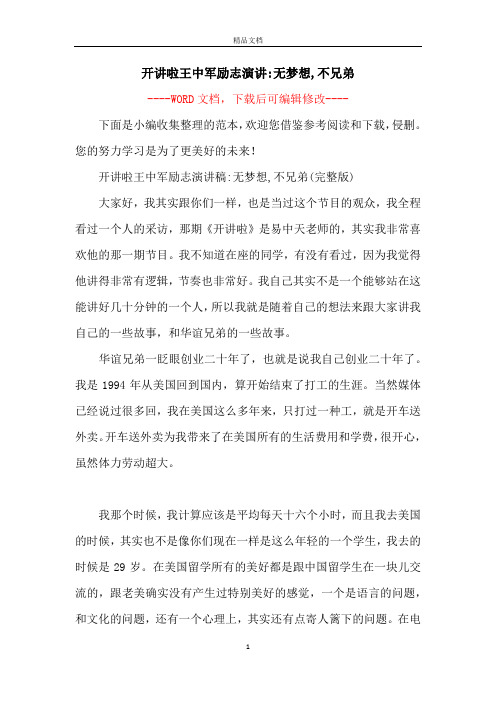
开讲啦王中军励志演讲:无梦想,不兄弟----WORD文档,下载后可编辑修改----下面是小编收集整理的范本,欢迎您借鉴参考阅读和下载,侵删。
您的努力学习是为了更美好的未来!开讲啦王中军励志演讲稿:无梦想,不兄弟(完整版)大家好,我其实跟你们一样,也是当过这个节目的观众,我全程看过一个人的采访,那期《开讲啦》是易中天老师的,其实我非常喜欢他的那一期节目。
我不知道在座的同学,有没有看过,因为我觉得他讲得非常有逻辑,节奏也非常好。
我自己其实不是一个能够站在这能讲好几十分钟的一个人,所以我就是随着自己的想法来跟大家讲我自己的一些故事,和华谊兄弟的一些故事。
华谊兄弟一眨眼创业二十年了,也就是说我自己创业二十年了。
我是1994年从美国回到国内,算开始结束了打工的生涯。
当然媒体已经说过很多回,我在美国这么多年来,只打过一种工,就是开车送外卖。
开车送外卖为我带来了在美国所有的生活费用和学费,很开心,虽然体力劳动超大。
我那个时候,我计算应该是平均每天十六个小时,而且我去美国的时候,其实也不是像你们现在一样是这么年轻的一个学生,我去的时候是29岁。
在美国留学所有的美好都是跟中国留学生在一块儿交流的,跟老美确实没有产生过特别美好的感觉,一个是语言的问题,和文化的问题,还有一个心理上,其实还有点寄人篱下的问题。
在电梯里看到穿着西装的打工的人,我就永远觉着他们像英雄一样,或是就像我的梦想一样。
我跟今天在北京电梯里送外卖的,或者送快递的小孩是一模一样的,你在电梯里,发现背一个包送外卖的,你们是白领,他都不好意思正脸看你,就是他非常紧张。
我当时是那个状态的,反正就跟人说你好,完了就完了,这个过程我觉着是使我有很大的锻炼吧,就是精神上的这种要强,或者是体力上的一种吃苦。
我回到国内创业,就像今天所有的创业者一样,都会给自己设定一个方向或者我到底要干什么,其实我在美国打工的最后一年就是不正经地打工,脑子已经不在那了,觉得自己已经不是一个送外卖的人,是未来的一个小老板。
《开讲啦》传播中国文化 开启欧洲四国之旅
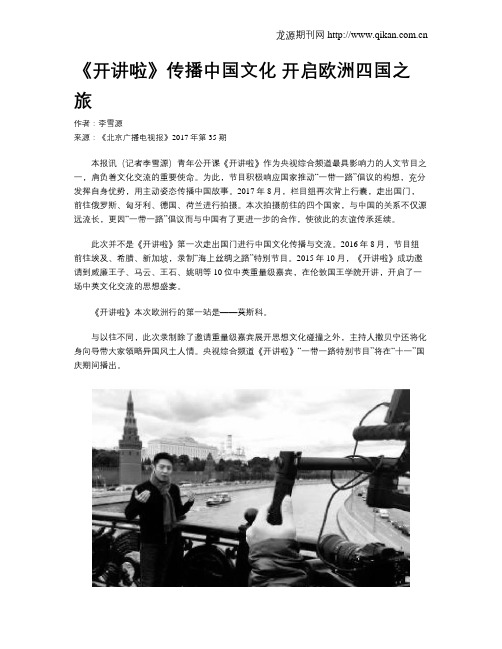
《开讲啦》传播中国文化开启欧洲四国之旅
作者:李雪源
来源:《北京广播电视报》2017年第35期
本报讯(记者李雪源)青年公开课《开讲啦》作为央视综合频道最具影响力的人文节目之一,肩负着文化交流的重要使命。
为此,节目积极响应国家推动“一带一路”倡议的构想,充分发挥自身优势,用主动姿态传播中国故事。
2017年8月,栏目组再次背上行囊,走出国门,前往俄罗斯、匈牙利、德国、荷兰进行拍摄。
本次拍摄前往的四个国家,与中国的关系不仅源远流长,更因“一带一路”倡议而与中国有了更进一步的合作,使彼此的友谊传承延续。
此次并不是《开讲啦》第一次走出国门进行中国文化传播与交流。
2016年8月,节目组前往埃及、希腊、新加坡,录制“海上丝绸之路”特别节目。
2015年10月,《开讲啦》成功邀请到威廉王子、马云、王石、姚明等10位中英重量级嘉宾,在伦敦国王学院开讲,开启了一场中英文化交流的思想盛宴。
《开讲啦》本次欧洲行的第一站是——莫斯科。
与以往不同,此次录制除了邀请重量级嘉宾展开思想文化碰撞之外,主持人撒贝宁还将化身向导带大家领略异国风土人情。
央视综合频道《开讲啦》“一带一路特别节目”将在“十一”国庆期间播出。
麦家我想重新出发,坐船去伦敦(标准版)
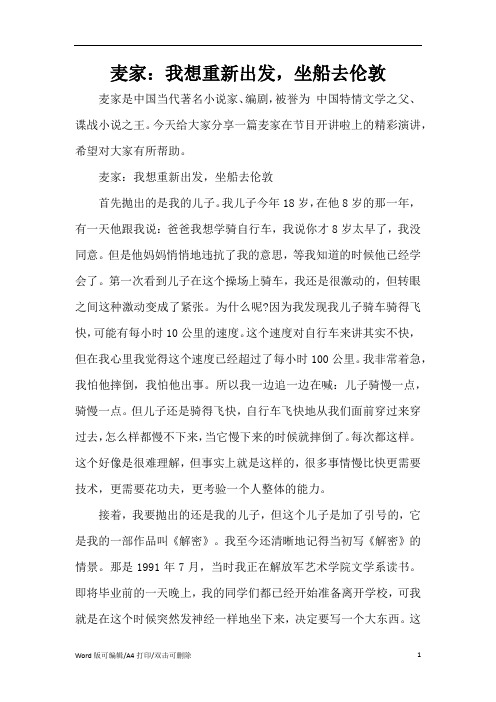
麦家:我想重新出发,坐船去伦敦麦家是中国当代著名小说家、编剧,被誉为中国特情文学之父、谍战小说之王。
今天给大家分享一篇麦家在节目开讲啦上的精彩演讲,希望对大家有所帮助。
麦家:我想重新出发,坐船去伦敦首先抛出的是我的儿子。
我儿子今年18岁,在他8岁的那一年,有一天他跟我说:爸爸我想学骑自行车,我说你才8岁太早了,我没同意。
但是他妈妈悄悄地违抗了我的意思,等我知道的时候他已经学会了。
第一次看到儿子在这个操场上骑车,我还是很激动的,但转眼之间这种激动变成了紧张。
为什么呢?因为我发现我儿子骑车骑得飞快,可能有每小时10公里的速度。
这个速度对自行车来讲其实不快,但在我心里我觉得这个速度已经超过了每小时100公里。
我非常着急,我怕他摔倒,我怕他出事。
所以我一边追一边在喊:儿子骑慢一点,骑慢一点。
但儿子还是骑得飞快,自行车飞快地从我们面前穿过来穿过去,怎么样都慢不下来,当它慢下来的时候就摔倒了。
每次都这样。
这个好像是很难理解,但事实上就是这样的,很多事情慢比快更需要技术,更需要花功夫,更考验一个人整体的能力。
接着,我要抛出的还是我的儿子,但这个儿子是加了引号的,它是我的一部作品叫《解密》。
我至今还清晰地记得当初写《解密》的情景。
那是1991年7月,当时我正在解放军艺术学院文学系读书。
即将毕业前的一天晚上,我的同学们都已经开始准备离开学校,可我就是在这个时候突然发神经一样地坐下来,决定要写一个大东西。
这种不合时宜的鲁莽举动,是否暗示了我将为《解密》付出成倍的时间和心力?但是我怎么也想不到,最后居然要用十余年来计算,准确的说20xx年,也就是我花了20xx年才写完这本书,真是受尽了折磨。
我经常跟他开玩笑《解密》是一个作女,我跟作女谈了一场恋爱,让我尝到了痛不欲身的感觉。
这部作品其实发表的时候总共也就是20万字,但我删掉的字数至少有4个20万,我在不停地修改、推倒重来。
因为受尽折磨,我真是多次决定要跟它分手,但是每一次分手最后都是以更加紧密地牵手而告终。
绿色的读后感5篇

绿色的读后感5篇(经典版)编制人:__________________审核人:__________________审批人:__________________编制单位:__________________编制时间:____年____月____日序言下载提示:该文档是本店铺精心编制而成的,希望大家下载后,能够帮助大家解决实际问题。
文档下载后可定制修改,请根据实际需要进行调整和使用,谢谢!并且,本店铺为大家提供各种类型的经典范文,如工作总结、工作方案、述职报告、思想汇报、演讲稿、条据书信、合同协议、教学资料、作文大全、其他范文等等,想了解不同范文格式和写法,敬请关注!Download tips: This document is carefully compiled by this editor. I hope that after you download it, it can help you solve practical problems. The document can be customized and modified after downloading, please adjust and use it according to actual needs, thank you!Moreover, our store provides various types of classic sample essays, such as work summaries, work plans, job reports, thought reports, speeches, evidence letters, contract agreements, teaching materials, complete essays, and other sample essays. If you would like to learn about different sample formats and writing methods, please stay tuned!绿色的读后感5篇优秀的读后感是我们对作品中的人物形象和性格特点的思考和描摹,通过读后感的写作,我们可以对书中的情节和结局进行评价和思考,提出自己的观点和见解,以下是本店铺精心为您推荐的绿色的读后感5篇,供大家参考。
2024年赵启正励志演讲稿:我向世界说明中国(开讲啦第9期)
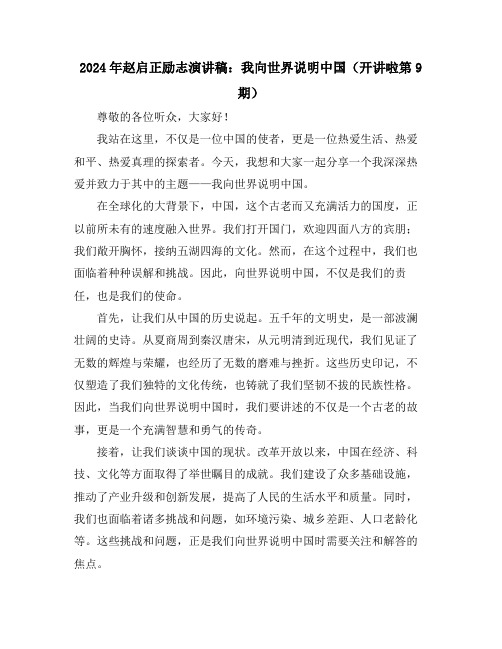
2024年赵启正励志演讲稿:我向世界说明中国(开讲啦第9期)尊敬的各位听众,大家好!我站在这里,不仅是一位中国的使者,更是一位热爱生活、热爱和平、热爱真理的探索者。
今天,我想和大家一起分享一个我深深热爱并致力于其中的主题——我向世界说明中国。
在全球化的大背景下,中国,这个古老而又充满活力的国度,正以前所未有的速度融入世界。
我们打开国门,欢迎四面八方的宾朋;我们敞开胸怀,接纳五湖四海的文化。
然而,在这个过程中,我们也面临着种种误解和挑战。
因此,向世界说明中国,不仅是我们的责任,也是我们的使命。
首先,让我们从中国的历史说起。
五千年的文明史,是一部波澜壮阔的史诗。
从夏商周到秦汉唐宋,从元明清到近现代,我们见证了无数的辉煌与荣耀,也经历了无数的磨难与挫折。
这些历史印记,不仅塑造了我们独特的文化传统,也铸就了我们坚韧不拔的民族性格。
因此,当我们向世界说明中国时,我们要讲述的不仅是一个古老的故事,更是一个充满智慧和勇气的传奇。
接着,让我们谈谈中国的现状。
改革开放以来,中国在经济、科技、文化等方面取得了举世瞩目的成就。
我们建设了众多基础设施,推动了产业升级和创新发展,提高了人民的生活水平和质量。
同时,我们也面临着诸多挑战和问题,如环境污染、城乡差距、人口老龄化等。
这些挑战和问题,正是我们向世界说明中国时需要关注和解答的焦点。
当然,我们不能忽视的是中国的未来。
作为一个拥有14亿人口的大国,中国的未来不仅关乎自身的繁荣与稳定,也影响着世界的和平与发展。
我们坚持走和平发展道路,致力于构建人类命运共同体,推动全球治理体系改革和完善。
我们相信,在未来的日子里,中国将以更加开放的姿态、更加包容的心态、更加自信的步伐,走向世界舞台的中央。
在这里,我想引用一句古人的名言:“读万卷书,行万里路。
”这句话告诉我们,要了解一个国家,不仅要学习它的历史和文化,还要走进它的现实和未来。
因此,当我们向世界说明中国时,不仅要讲述我们的历史和传统,还要展示我们的发展和进步,更要展望我们的梦想和追求。
开讲了Word
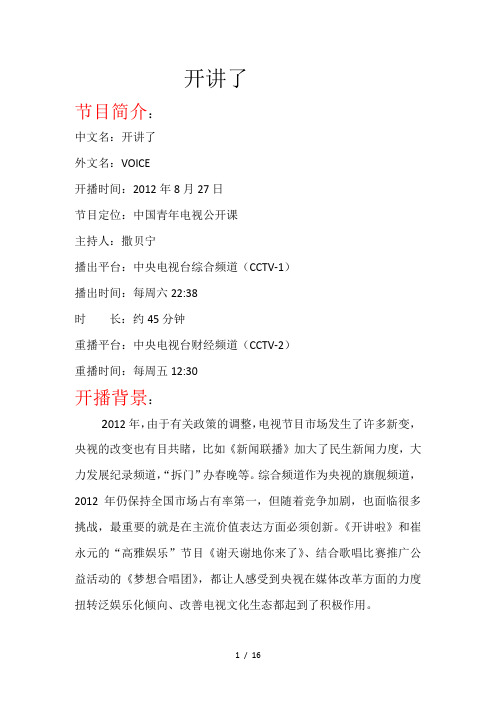
开讲了节目简介:中文名:开讲了外文名:VOICE开播时间:2012年8月27日节目定位:中国青年电视公开课主持人:撒贝宁播出平台:中央电视台综合频道(CCTV-1)播出时间:每周六22:38时长:约45分钟重播平台:中央电视台财经频道(CCTV-2)重播时间:每周五12:30开播背景:2012年,由于有关政策的调整,电视节目市场发生了许多新变,央视的改变也有目共睹,比如《新闻联播》加大了民生新闻力度,大力发展纪录频道,“拆门”办春晚等。
综合频道作为央视的旗舰频道,2012年仍保持全国市场占有率第一,但随着竞争加剧,也面临很多挑战,最重要的就是在主流价值表达方面必须创新。
《开讲啦》和崔永元的“高雅娱乐”节目《谢天谢地你来了》、结合歌唱比赛推广公益活动的《梦想合唱团》,都让人感受到央视在媒体改革方面的力度扭转泛娱乐化倾向、改善电视文化生态都起到了积极作用。
节目形式:《开讲啦》,邀请“中国青年心中的榜样”作为演讲嘉宾,演讲嘉宾来自各行各业,有科学家、企业家、老师和作家等,嘉宾演讲主题如“给世界一个微笑”、“磨难是最好的礼物等均积极向上,贴近受众。
节目分享他们对于生活和生命的感悟,给予中国青年现实的讨论和心灵的滋养,讨论青年们的人生问题,同时也在讨论青春中国的社会问题。
节目每期有八至十位来自全国各大高校的青年代表,向演讲嘉宾提问互动,300位大学生作为观众现场分享这场有思考、有疑问、有价值观、有锋芒的思想碰撞。
他们对人生有思考,对未来有疑问,他们思想新锐,观点先锋,是中国未来的中坚力量。
每期演讲嘉宾选择的主题,均为当下年轻人心中的问号,讲述青年最关心、最困惑的话题。
这是中国最具青年公益的节目,千名青年学子,百回思想交锋,十场灵魂演讲。
这个盛夏,聆听思想的声音!节目主持:撒贝宁,男,湖北武汉人,中央电视台著名主持人。
外形俊朗帅气的他文艺特长出众,而且天生一副好嗓音,当年以一曲《小白杨》打动评委被保送到北京大学法学院深造,曾是红极一时叱咤风云的“校霸”人物。
开讲啦各期演讲主题
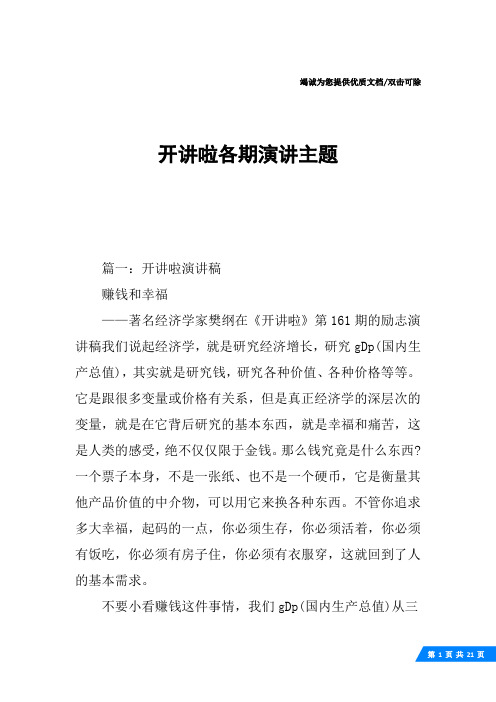
竭诚为您提供优质文档/双击可除开讲啦各期演讲主题篇一:开讲啦演讲稿赚钱和幸福——著名经济学家樊纲在《开讲啦》第161期的励志演讲稿我们说起经济学,就是研究经济增长,研究gDp(国内生产总值),其实就是研究钱,研究各种价值、各种价格等等。
它是跟很多变量或价格有关系,但是真正经济学的深层次的变量,就是在它背后研究的基本东西,就是幸福和痛苦,这是人类的感受,绝不仅仅限于金钱。
那么钱究竟是什么东西?一个票子本身,不是一张纸、也不是一个硬币,它是衡量其他产品价值的中介物,可以用它来换各种东西。
不管你追求多大幸福,起码的一点,你必须生存,你必须活着,你必须有饭吃,你必须有房子住,你必须有衣服穿,这就回到了人的基本需求。
不要小看赚钱这件事情,我们gDp(国内生产总值)从三十多年前的150美元,到现在的8000美元,这是一个历史过程,这就是我们大家努力赚钱的结果。
没有这么多企业家,没有这么多农民工,没有我们每个人去斤斤计较、去利用每一个市场机会,我们不会走到今天。
所以不要批判赚钱,不要把赚钱当作一个下九流的事情。
但是反过来讲,赚了钱不一定就很幸福。
我就讲一个经济学比较矛盾的事情,人类的进步、幸福的增长,很大程度上是因为人们的劳动时间不断减少,闲暇不断增加。
而人类的幸福很大程度上在于闲暇的增长,在于它生产力提高,不需要花那么多时间去赚那些基本的钱,就可以享受同样的幸福。
闲暇是不包含在gDp(国内生产总值)里边的,是没法用钱来衡量的。
你赚的钱是同样的,但是你花了更少的时间去赚的钱,一般情况下是比较幸福的。
那么我们现在的努力奋斗,也是为了我们的这一代、我们的下一代,可以有更多的闲暇,我们可以用更多的时间来享受我们自己,享受拿钱买不来的一些东西。
幸福不仅仅是个人的事情,幸福是一件社会的事情。
基本的道理就是关于差距的问题、关于攀比的问题。
世界上最不幸福的事情,还不在于你贫穷;最让人不幸福的,是你贫穷,而你看着别人很富有,你这种差距使你更不幸福。
马云《开讲啦》英国行演讲稿
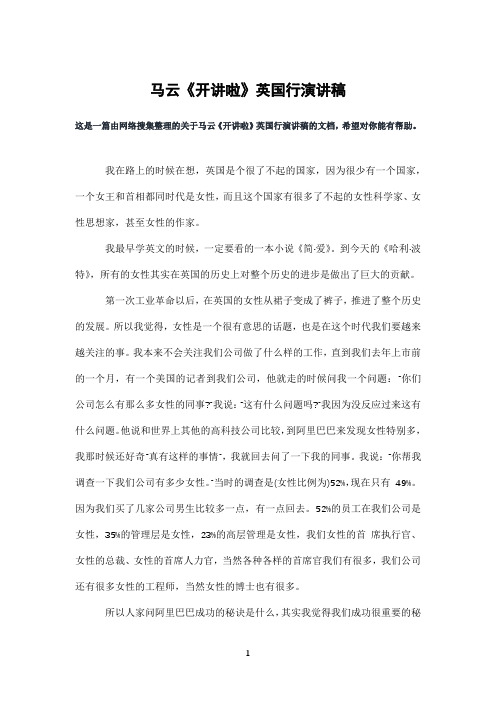
马云《开讲啦》英国行演讲稿这是一篇由网络搜集整理的关于马云《开讲啦》英国行演讲稿的文档,希望对你能有帮助。
我在路上的时候在想,英国是个很了不起的国家,因为很少有一个国家,一个女王和首相都同时代是女性,而且这个国家有很多了不起的女性科学家、女性思想家,甚至女性的作家。
我最早学英文的时候,一定要看的一本小说《简·爱》。
到今天的《哈利·波特》,所有的女性其实在英国的历史上对整个历史的进步是做出了巨大的贡献。
第一次工业革命以后,在英国的女性从裙子变成了裤子,推进了整个历史的发展。
所以我觉得,女性是一个很有意思的话题,也是在这个时代我们要越来越关注的事。
我本来不会关注我们公司做了什么样的工作,直到我们去年上市前的一个月,有一个美国的记者到我们公司,他就走的时候问我一个问题:“你们公司怎么有那么多女性的同事?”我说:“这有什么问题吗?”我因为没反应过来这有什么问题。
他说和世界上其他的高科技公司比较,到阿里巴巴来发现女性特别多,我那时候还好奇“真有这样的事情”,我就回去问了一下我的同事。
我说:“你帮我调查一下我们公司有多少女性。
”当时的调查是(女性比例为)52%,现在只有49%。
因为我们买了几家公司男生比较多一点,有一点回去。
52%的员工在我们公司是女性,35%的管理层是女性,23%的高层管理是女性,我们女性的首席执行官、女性的总裁、女性的首席人力官,当然各种各样的首席官我们有很多,我们公司还有很多女性的工程师,当然女性的博士也有很多。
所以人家问阿里巴巴成功的秘诀是什么,其实我觉得我们成功很重要的秘诀就是我们有大量的女性,这不是我讨好女性才去说这句话。
事实上证明,阿里巴巴可能是全世界高科技公司工作过程中女性比例最高的。
但是我没有觉得作为一个首席执行官一定要去推广女性在公司中的位置。
所以记者问这个问题的时候我都没反应过来,我觉得不是挺好吗,我们的十八个创始人中,三分之一以上是女性,我觉得好像理所当然只有男女在一起、大家数量差不多,感觉才会好,工作才会有创新。
开讲啦凯莉·赫本演讲稿:当东方遇见西方
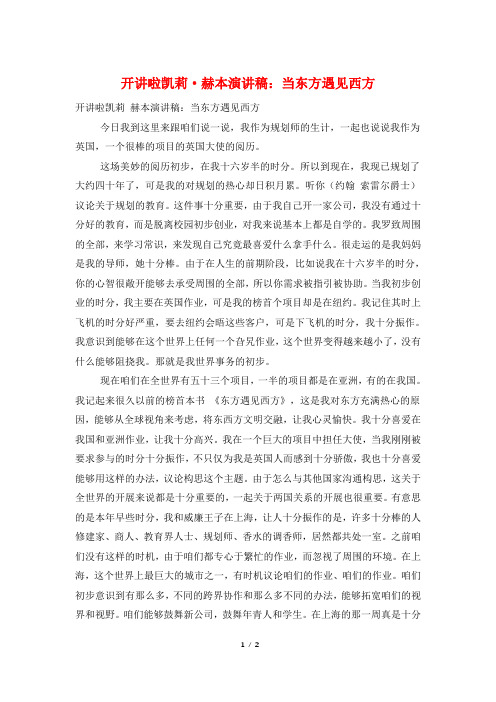
开讲啦凯莉·赫本演讲稿:当东方遇见西方开讲啦凯莉赫本演讲稿:当东方遇见西方今日我到这里来跟咱们说一说,我作为规划师的生计,一起也说说我作为英国,一个很棒的项目的英国大使的阅历。
这场美妙的阅历初步,在我十六岁半的时分。
所以到现在,我现已规划了大约四十年了,可是我的对规划的热心却日积月累。
听你(约翰索雷尔爵士)议论关于规划的教育。
这件事十分重要,由于我自己开一家公司,我没有通过十分好的教育,而是脱离校园初步创业,对我来说基本上都是自学的。
我罗致周围的全部,来学习常识,来发现自己究竟最喜爱什么拿手什么。
很走运的是我妈妈是我的导师,她十分棒。
由于在人生的前期阶段,比如说我在十六岁半的时分,你的心智很敞开能够去承受周围的全部,所以你需求被指引被协助。
当我初步创业的时分,我主要在英国作业,可是我的榜首个项目却是在纽约。
我记住其时上飞机的时分好严重,要去纽约会晤这些客户,可是下飞机的时分,我十分振作。
我意识到能够在这个世界上任何一个旮旯作业,这个世界变得越来越小了,没有什么能够阻挠我。
那就是我世界事务的初步。
现在咱们在全世界有五十三个项目,一半的项目都是在亚洲,有的在我国。
我记起来很久以前的榜首本书《东方遇见西方》,这是我对东方充满热心的原因,能够从全球视角来考虑,将东西方文明交融,让我心灵愉快。
我十分喜爱在我国和亚洲作业,让我十分高兴。
我在一个巨大的项目中担任大使,当我刚刚被要求参与的时分十分振作,不只仅为我是英国人而感到十分骄傲,我也十分喜爱能够用这样的办法,议论构思这个主题。
由于怎么与其他国家沟通构思,这关于全世界的开展来说都是十分重要的,一起关于两国关系的开展也很重要。
有意思的是本年早些时分,我和威廉王子在上海,让人十分振作的是,许多十分棒的人修建家、商人、教育界人士、规划师、香水的调香师,居然都共处一室。
之前咱们没有这样的时机,由于咱们都专心于繁忙的作业,而忽视了周围的环境。
在上海,这个世界上最巨大的城市之一,有时机议论咱们的作业、咱们的作业。
部编版三年级语文上册《语文园地六》同步练习附答案
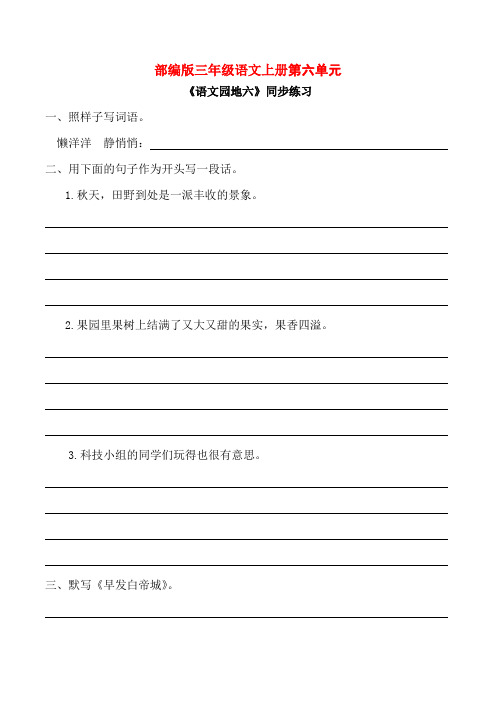
部编版三年级语文上册第六单元《语文园地六》同步练习一、照样子写词语。
懒洋洋静悄悄:二、用下面的句子作为开头写一段话。
1.秋天,田野到处是一派丰收的景象。
2.果园里果树上结满了又大又甜的果实,果香四溢。
3.科技小组的同学们玩得也很有意思。
三、默写《早发白帝城》。
参考答案一、慢腾腾颤巍巍兴冲冲空荡荡乱糟糟闹哄哄二、1.秋天,田野到处是一派丰收的景象。
胖嘟嘟的南瓜,紫得发亮的茄子,穿着红绸裙的红萝卜与穿着白礼服的白萝卜,它们三个一群,五个一伙,从地底下出头来,呼吸着新鲜的空气。
玉米有着灰黑色的胡子,乐的露出了金黄色的大金牙。
整个田野美丽极了。
2.果园里果树上结满了又大又甜的果实,果香四溢。
苹果绽开了红红的笑脸,又大又黄的梨金灿灿的,石榴露出整齐的牙齿咧开嘴笑了,一串串珍珠似的葡萄,红红的柿子像一个个小红灯笼。
果农们也带着丰收喜悦的心情忙着摘果子,把它们整齐地装在箱子里,运到世界各地去。
3.科技小组的同学们玩得也很有意思。
看!同学们和车模迷们高兴地跑啊,跳啊,心里多么地欢畅!玩航摸的同学控制着自己心爱的小船,和别的同学一比高低。
玩水火箭的同学也玩得很有劲。
瞧!他们认真的样子,准能把对方打个“落花流水!”三、早发白帝城(唐)李白朝辞白帝彩云间,千里江陵一日还。
两岸猿声啼不住,轻舟已过万重山。
部编版三年级语文上册第六单元复习卡一、听两遍朗读录音,并回答下列问题。
1.()是中国首档青年电视公开课。
A.《见字如面》B.《朗读者》C.《开讲啦》2.《开讲啦》节目在()年播出了“海上丝绸之路”系列特别节目。
A.2015B.2016C.20173.《开讲啦》荣获第()届上海电视节最佳周播电视节目奖。
A.23B.24C.25二、下列加点字读音有误的一项是()A.富饶.(ráo)建设.(shè)瑰.丽(ɡuī)B.海鸥.(ōu)相宜.(yì)凤凰.(huánɡ)C.侧.身(cè)每逢.(fénɡ)理睬.(cǎi)D.融.化(rónɡ)未.来(wèi)膝.盖(xī)三、拼写乐园。
作文素材:《开讲啦》百位嘉宾精彩语录合集,收藏!

文作文素材:《开讲啦》百位嘉宾精彩语录合集,收藏!《开讲啦》是由中央广播电视总台央视综合频道和唯众传媒联合制作的中国青年电视公开课节目,由撒贝宁担任节目主持人。
节目邀请“中国青年心中的榜样”作为演讲嘉宾,分享他们对于生活和生命的感悟,给予中国青年现实的讨论和心灵的滋养。
讨论青年们的人生问题,同时也在讨论青春中国的社会问题。
节目于2012年8月27日起每周六22:38在中央电视台综合频道播出。
最新一期是2022年1月22日。
撒贝宁:如果今天这个节目是你青春生命当中一个短暂的隧道,在节目结束之前,你曾有过的、现在正在经历的困惑迷茫,不一定全部结束,哪怕稍稍减轻,就是我们最好的期待!刘国梁:有时候受点刺激不是坏事,你要是化解得好的话,会让你内心更强大。
林丹:打坏多少球拍,已经不是最重要的了。
因为你以为自己打坏了1500个球拍,但是你的对手很有可能打坏了2500个。
邓亚萍:如果你满足了,就会停滞,只有不满足,才有冲动去努力,所以任何事情都有两面性,在你感觉不好的时候,反而会选择最好的道路,有的时候人不能有太多的后路,当自己只有一条路的时候,你恰恰才能够拼出来。
陈一冰:我能够正视这块银牌的时候,我觉得我陈一冰长大了。
银牌对我来说,一样能尊重我的付出,尊重我的努力,尊重一切我自己认为我对得起自己的事情。
所以当我经历过这些以后,我觉得能坦然接受竞技场上第二,但人生场上一定会做自己的冠军。
陈一冰:命运就是这样,人生可能看似有很多的不完美,但是也许在不完美的时候,冥冥中又带有完美,很多事情没有你想象的那么糟糕。
冯喆:我这一生中哭过两次:第一次就是在2008年奥运会落选的时候;第二次就是在我买了冰激凌还没吃就掉地上的时候。
冯喆:不快乐的事情应该迅速忘掉,不要耽误你下面一件事情。
因为你不快乐不高兴,也不能改变结果,还不如高兴地去面对它,也许结果会让你意想不到。
科比:我一定要赢了自己,赢了伤痛,重返赛场。
这样才能让那些怀疑我的人重新思考,什么叫将不可能变成可能。
部编版三年级语文上册《美丽的小兴安岭》同步练习附答案(2)

部编版三年级语⽂上册《美丽的⼩兴安岭》同步练习附答案(2)部编版三年级语⽂上册第六单元《美丽的⼩兴安岭》同步练习⼀、把合适的词语连起来。
嫩绿的宝库抽出影⼦蓝蓝的叶⼦欣赏⽩雪美丽的天空积满膝盖巨⼤的花坛没过枝条⼆、读下⾯的句⼦,欣赏画线的词语。
1.春天,树⽊抽出新的枝条,长出嫩绿的叶⼦。
“抽出”⽤得真好,它让我仿佛看到了。
2.早晨,雾从⼭⾕⾥升起来,整个森林浸在乳⽩⾊的浓雾⾥。
“浸”字⽤得真妙,它让我感受到。
3.秋风吹来,落叶在林间飞舞。
“飞舞”⽤得真⽣动,它让我的眼前出现了。
三、课⽂整体梳理。
按春夏秋冬的顺序排列下⾯描写⼩兴安岭的树⽊的句⼦。
()落叶在林间飞舞。
()树⽊长得葱葱茏茏。
()树⽊抽出新的枝条,长出嫩绿的叶⼦。
()树上积满了⽩雪。
四、重点段落品析。
冬天,雪花在空中飞舞。
树上积满了⽩雪。
地上的雪厚厚的,⼜松⼜软,常常没过膝盖。
西北风呼呼地刮过树梢。
紫貂和⿊熊不得不躲进各⾃的洞⾥。
紫貂捕到⼀只野兔当美餐,⿊熊只好⽤⾆头舔着⾃⼰⼜肥⼜厚的脚掌。
松⿏靠秋天收藏在树洞⾥的松⼦过⽇⼦,有时候还到枝头散散步,看看春天是不是快要来临。
1.照样⼦写词语。
⼜肥⼜厚的脚掌⼜()⼜()的()⼜()⼜()的()2.你喜欢⼩兴安岭的冬天吗?为什么?3.你能写出四个描写冬天的四字成语吗?(雪花飞舞)()()()()五、写写⾃⼰的家乡。
你觉得家乡哪个季节最美?为什么?仿照课⽂写⼀写。
参考答案:⼀、嫩绿的叶⼦蓝蓝的天空美丽的花坛巨⼤的宝库抽出枝条欣赏影⼦积满⽩雪没过膝盖⼆、1.枝条快速⽽有⼒长出来2.森林就像⼀幅⽔墨画,画⾯有⼀种朦胧美,⾮常⽣动3.落叶随着秋风悠悠飘落的情景三、(3)(2)(1)(4)四、1.⼜(⿊)⼜(亮)的(眼睛)⼜(⾹)⼜(甜)的(苹果)2.喜欢。
因为⼤兴安岭的冬天,林中雪花飞舞,到处是厚厚的积雪,各种动物准备过冬,⼀派北国风光。
3.⽩雪皑皑滴⽔成冰银装素裹寒风凛冽五、家乡的夏天来得特别早,骄阳似⽕,热不可耐孩⼦们纠缠着爸爸妈妈带他们到河⾥游泳,“扑通扑通,”⼀个接着⼀个往⽔⾥跳,在⽔⾥游泳,⽐赛。
部编版三年级语文上册《望天门山》同步练习附答案

部编版三年级语文上册第六单元《望天门山》同步练习一、根据古诗内容完成填空。
1.《望天门山》是代诗人所作,人称,他写了大量歌颂祖国河山的诗篇,我知道的还有《》《》。
2.这首诗通过、、、、、六个动词,让我们仿佛看到了的美景。
3.本诗第一句中一词写出了天门山的山势奇险;一、二句中、两个字写出了长江冲决一切奔腾向前的水势;二、三句中、写出了水和山的颜色美。
二、请按下列提示从诗中找出相应的句子。
1.使人联想到佳木葱茏的句子:2.使人联想到清江如练的句子:三、课外拓展。
古往今来,人们用美好的语言赞美祖国的大好河山。
如写山的“横看成岭侧成峰,远近高低各不同”,写水的“飞流直下三千尺,疑是银河落九天”。
你还能找出描写美好河山的诗句吗?参考答案一、1.唐李白诗仙望庐山瀑布早发白帝城2.断开流回出来天门山3.中断开流二、1.两岸青山相对出。
2.碧水东流至此回。
三、示例:飞流直下三千尺,疑是银河落九天。
两个黄鹂鸣翠柳,一行白鹭上青天。
碧玉妆成一树高,万条垂下绿丝绦。
胜日寻芳泗水滨,无边光景一时新。
部编版三年级语文上册第六单元复习卡一、听两遍朗读录音,并回答下列问题。
1.()是中国首档青年电视公开课。
A.《见字如面》B.《朗读者》C.《开讲啦》2.《开讲啦》节目在()年播出了“海上丝绸之路”系列特别节目。
A.2015B.2016C.20173.《开讲啦》荣获第()届上海电视节最佳周播电视节目奖。
A.23B.24C.25二、下列加点字读音有误的一项是()A.富饶.(ráo)建设.(shè)瑰.丽(ɡuī)B.海鸥.(ōu)相宜.(yì)凤凰.(huánɡ)C.侧.身(cè)每逢.(fénɡ)理睬.(cǎi)D.融.化(rónɡ)未.来(wèi)膝.盖(xī)三、拼写乐园。
1.看拼音,写词语。
2.根据语境写字词。
(1)密密层层的枝叶把森林封得很yán shi(),dǎnɡ zhù()了人们的shì xiàn()。
部编版三年级语文上册《富饶的西沙群岛》同步练习附答案 (2)
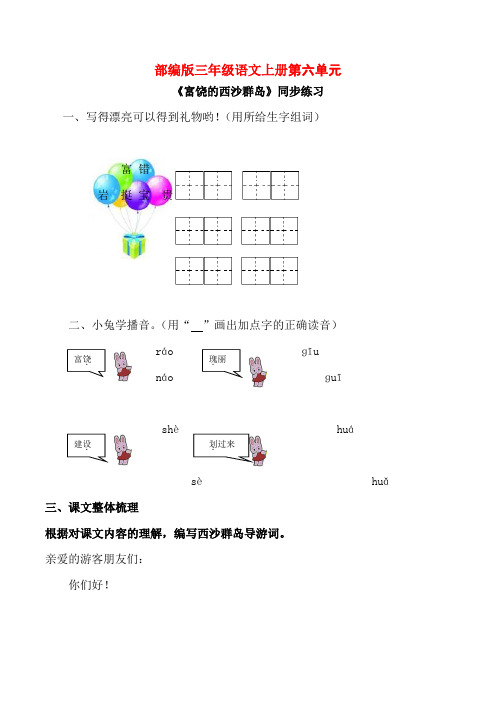
部编版三年级语文上册第六单元《富饶的西沙群岛》同步练习一、写得漂亮可以得到礼物哟!(用所给生字组词)富错岩挺宝贵二、小兔学播音。
(用“”画出加点字的正确读音)ráo ɡīunáo ɡuī shè huásè huǎ三、课文整体梳理根据对课文内容的理解,编写西沙群岛导游词。
亲爱的游客朋友们:你们好!瑰.丽富饶.划.过来建设.欢迎来到()()的西沙群岛。
西沙群岛是()。
这里风景优美,海水(),海底有(),海滩上()。
西沙群岛物产也很丰富,海里有(),海岛上有()。
四、重点段落品析1.阅读片段,完成练习。
鱼成群结队地在珊瑚丛中穿来穿去,好看极了。
有的全身布满彩色的条纹;有的头上长着一簇红缨;有的周身像插着好些扇子,游动的时候飘飘摇摇;有的眼睛圆溜溜的,身上长满了刺,鼓起气来像皮球一样圆。
各种各样的鱼多得数不清。
正像人们说的那样,西沙群岛的海里一半是水,一半是鱼。
(1)这段话主要写了西沙群岛的海里鱼的多,多。
(2)在描写鱼的样子的句子下面画“”。
(3)这段话中最后一句话的意思是()。
A.西沙群岛的海里鱼和水各占一半。
B.用“一半是水,一半是鱼”突出说明了西沙群岛的海里鱼非常多。
(4)用“有的……有的……有的……”句式写一句话。
(5)联系生活中见过的鱼,描写一种或几种你喜欢的鱼。
五、写话练习。
围绕“那里风景优美,物产丰富,是个可爱的地方”,用一段话描写自己熟悉的一个地方。
参考答案一、财富交错岩石挺立宝贝珍贵二、ráo ɡuī shè huá三、亲爱的游客朋友们:你们好!欢迎来到风景优美、物产丰富的西沙群岛。
西沙群岛是南海上的一群岛屿。
这里风景优美,海水五光十色,瑰丽无比,海底山崖和峡谷,海滩上美丽的贝壳。
西沙群岛物产也很丰富,海里有珊瑚和鱼,海岛上有茂密的森林。
四、(1)种类数量(2)有的全身布满彩色的条纹;有的头上长着一簇红缨;有的周身像插着好些扇子,游动的时候飘飘摇摇,有的眼睛圆溜溜的,身上长满了刺,鼓起气来像皮球一样圆。
《开讲啦》威廉王子登上中国综艺节目演讲
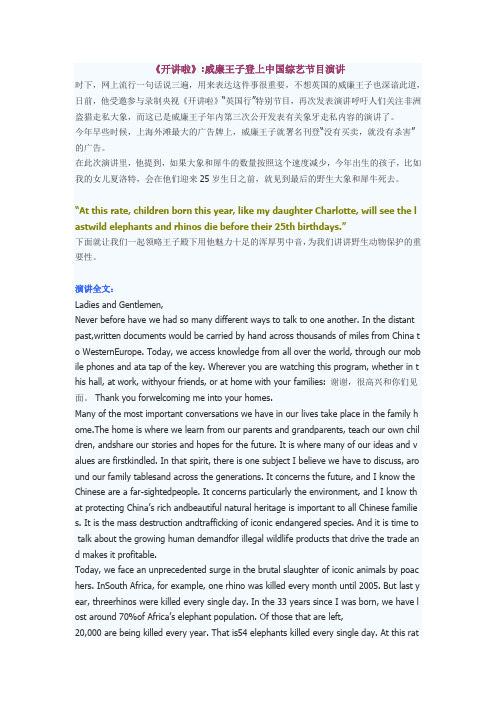
《开讲啦》:威廉王子登上中国综艺节目演讲时下,网上流行一句话说三遍,用来表达这件事很重要,不想英国的威廉王子也深谙此道,日前,他受邀参与录制央视《开讲啦》“英国行”特别节目,再次发表演讲呼吁人们关注非洲盗猎走私大象,而这已是威廉王子年内第三次公开发表有关象牙走私内容的演讲了。
今年早些时候,上海外滩最大的广告牌上,威廉王子就署名刊登“没有买卖,就没有杀害”的广告。
在此次演讲里,他提到,如果大象和犀牛的数量按照这个速度减少,今年出生的孩子,比如我的女儿夏洛特,会在他们迎来25岁生日之前,就见到最后的野生大象和犀牛死去。
“At this rate, children born this year, like my daughter Charlotte, will see the l astwild elephants and rhinos die before their 25th birthdays.”下面就让我们一起领略王子殿下用他魅力十足的浑厚男中音,为我们讲讲野生动物保护的重要性。
演讲全文:Ladies and Gentlemen,Never before have we had so many different ways to talk to one another. In the distant past,written documents would be carried by hand across thousands of miles from China t o WesternEurope. Today, we access knowledge from all over the world, through our mob ile phones and ata tap of the key. Wherever you are watching this program, whether in t his hall, at work, withyour friends, or at home with your families: 谢谢,很高兴和你们见面。
- 1、下载文档前请自行甄别文档内容的完整性,平台不提供额外的编辑、内容补充、找答案等附加服务。
- 2、"仅部分预览"的文档,不可在线预览部分如存在完整性等问题,可反馈申请退款(可完整预览的文档不适用该条件!)。
- 3、如文档侵犯您的权益,请联系客服反馈,我们会尽快为您处理(人工客服工作时间:9:00-18:30)。
《开讲啦》:威廉王子登上中国综艺节目演讲时下,网上流行一句话说三遍,用来表达这件事很重要,不想英国的威廉王子也深谙此道,日前,他受邀参与录制央视《开讲啦》“英国行”特别节目,再次发表演讲呼吁人们关注非洲盗猎走私大象,而这已是威廉王子年内第三次公开发表有关象牙走私内容的演讲了。
今年早些时候,上海外滩最大的广告牌上,威廉王子就署名刊登“没有买卖,就没有杀害”的广告。
在此次演讲里,他提到,如果大象和犀牛的数量按照这个速度减少,今年出生的孩子,比如我的女儿夏洛特,会在他们迎来25岁生日之前,就见到最后的野生大象和犀牛死去。
“At this rate, children born this year, like my daughter Charlotte, will see the l astwild elephants and rhinos die before their 25th birthdays.”下面就让我们一起领略王子殿下用他魅力十足的浑厚男中音,为我们讲讲野生动物保护的重要性。
演讲全文:Ladies and Gentlemen,Never before have we had so many different ways to talk to one another. In the distant past,written documents would be carried by hand across thousands of miles from China t o WesternEurope. Today, we access knowledge from all over the world, through our mob ile phones and ata tap of the key. Wherever you are watching this program, whether in t his hall, at work, withyour friends, or at home with your families: 谢谢,很高兴和你们见面。
Thank you forwelcoming me into your homes.Many of the most important conversations we have in our lives take place in the family h ome.The home is where we learn from our parents and grandparents, teach our own chil dren, andshare our stories and hopes for the future. It is where many of our ideas and v alues are firstkindled. In that spirit, there is one subject I believe we have to discuss, aro und our family tablesand across the generations. It concerns the future, and I know the Chinese are a far-sightedpeople. It concerns particularly the environment, and I know th at protecting China’s rich andbeautiful natural heritage is important to all Chinese familie s. It is the mass destruction andtrafficking of iconic endangered species. And it is time to talk about the growing human demandfor illegal wildlife products that drive the trade an d makes it profitable.Today, we face an unprecedented surge in the brutal slaughter of iconic animals by poac hers. InSouth Africa, for example, one rhino was killed every month until 2005. But last y ear, threerhinos were killed every single day. In the 33 years since I was born, we have l ost around 70%of Africa’s elephant population. Of those that are left,20,000 are being killed every year. That is54 elephants killed every single day. At this rate, children born this year, like my daughterCharlotte, will see the last wild elephants and rhinos die before their 25th birthdays.Those who suffer the most from this loss are some of the poorest people on our planet. Theyare the families who feel powerless as wildlife around them disappear, who face bei ng trapped inpoverty forever, without the income that should be brought in by tourism, a cornerstone of theeconomy in many developing nations. They are the children whose pa rents risk their lives in thefight against poachers. In the last few days, three rangers and one member of the armedforces were killed by poachers in one incident in Central Africa, leaving behind 14 children betweenthem. It is these children’s future that is blighted so t ragically by the illegal wildlife trade, and it istheir birthright that is stolen.There is no hiding from these facts today. On our phones, laptops and our TV screens, w e cansee the images and read the reports that lay bare the truth of this crisis. That know ledge bringsresponsibility: the responsibility to do everything in our power to reverse the march towardseradication of these fine animals.The good news is that we are far from powerless in this struggle. We can turn the tide of extinction. We know where the animals we are trying to protect live. We know many of t heroads, the airports and ports criminals use to transfer their cargo, from killing fields to marketplace.And over the last few years, we have seen a groundswell of action by governments to im provetheir laws and to work across borders to fight the traffickers. Only last month, Presi dent Xiannounced that China would take steps to halt the domestic trade in ivory, adding to the ban onivory carving imports he announced in February.But we know the illegal wildlife trade cannot be solved by governments alone. The spotli ght fallsback on all of us, and on the choices we have to make to play our parts in addres sing thisproblem. We have to accept the truth: that consumers are driving the demand fo r animal bodyparts — for arts, for trinkets, or for medicine. Only we as consumers can pu t the wildlifetraffickers out of business by ending our demand for their products. I know we can do this.The desire to possess animal trophies or ornaments made from ivory has been felt on ev erycontinent for centuries. I know this topic is sensitive for many families. For example, u ntil ahundred years ago, my ancestors were those who had little concern about acquiring ivorywithout the knowledge of the threats of extinction, corruption and violence that the ivory tradewould lead to. My rejection of ivory today is not a judgment of past generatio ns. It is anacceptance of the world as I find it today, and the world that I want my childr en, George andCharlotte, to inherit.Likewise, those doctors and medical practitioners in China who are speaking out againste ndangered species in medicine. They are not judging previous generations who did not h avethe facts that you do today. They are just accepting the truth: that all credible eviden ce andscientific research shows, for example, that rhino horn cannot cure cancer. We ha ve aresponsibility to act on the facts that we have today. By doing so, we are honoring t hegenerations that have come before us and we are protecting those that are yet to com e.I do not think that anyone would stand and watch an elephant or rhino being killed. Or a rangerbeing gunned down because we wanted a bracelet or an ornament to impress so meone else asa gift. But that is what the demand for wildlife products means in practice. The decisions wemake as consumers affect the lives of ordinary people thousands and th ousands of miles away,in countries we may never visit. If we buy illegal wildlife products, we are contributing to theextinction of whole species.But there is good news, and if you remember one thing, I want you to remember this: W e canwin the battle. Each generation decides what it values. Each generation can determi ne what weconsider to be beautiful on the one hand, or unacceptable, or immoral on the other. We can actin solidarity with those fighting poaching and trafficking in their comm unities.I am absolutely convinced that China can become a global leader in the protection of wil dlife.Your influence in the world means you can change the face of conservation in this c entury. Thiswill be a contribution that would go down in history, one that your great gran dchildren wouldspeak of with great pride.The greatest inheritance we can pass on to the next generation is a safe and sustainable environment, the priceless endowment of nature. Let us not tell our children the sad taleof howwe watched as the last elephants, rhinos and tigers died out, but the inspiring stor y of how weturned the tide and preserved them for all humanity. And in so doing, let us show the world thatby working together we can stand up to the great challenges our pla net and our families will facein the generations to come.谢谢!。
